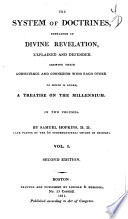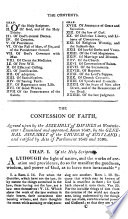 | Samuel Hopkins - Millennium (Eschatology) - 1811 - 506 pages
...faith, in words a little different, " God, from all eternity did, by the most wise and holy council of his own will, freely and unchangeably ordain whatsoever comes to pass." The decrees of God must be from eternity, and not in time. He who exists without beginning, absolutely... | |
 | Presbyterianism - 1813 - 580 pages
...Holy Ghost eternally proceeding from the Father and the Son q. CHAP. III. Of God's eternal Decree. GOD from all eternity did, by the most wise and holy...yet so, as thereby neither is God the author of sin b, nor is violence offered to the will of the creatures, nor is the liberty or contingency of second... | |
 | Encyclopedias and dictionaries - 1816 - 770 pages
...unchangeably ordain whatfoever comes to pafs : yet fo, as thereby neither is God the author of fin, nor is violence offered to the will of the creatures, nor is the liberty or contingency of fecond caufei taken away, but rather eftablifiied. Although GcJ knows whatfoever may or can come to... | |
 | Samuel Pelton - Methodism - 1822 - 294 pages
...tion of the world, without exception ? A. It is all certain with him. [I read the same chapter.] " God, from all eternity, did, by the most wise and...violence offered to the will of the creatures, nor the liberty or contingencies of second causes taken away, but rather established." Q,. 18. Can you... | |
 | Encyclopedias and dictionaries - 1823 - 872 pages
...Up. duttiinp on this head, we transcribe the following passage from {V^0*1'" that Confession: "Cod from all eternity did, by the most wise and holy counsel...God knows whatsoever may or can come to pass upon Ħill supposed conditions; yet hath he not decreed any thing because lie foresaw it ач future, or... | |
 | Samuel Greatheed, Daniel Parken, Theophilus Williams, Josiah Conder, Thomas Price, Jonathan Edwards Ryland, Edwin Paxton Hood - English literature - 1823 - 610 pages
...unexceptionably explicit on this point. ' Nor is violence,' they say, speaking of the Divine Decrees, ' offered to the will of the creatures, nor is the liberty...second causes taken away, but rather established.'* Again : ' God hath endued the will of man with that natural liberty, that is neither forced, nor by... | |
 | 1823 - 624 pages
...unexceptionably explicit on this point. ' Nor is violence,' they say, speaking of the Divine Decrees, ' offered to the will of the creatures, nor is the liberty...second causes taken away, but rather established.'* Again : ' God hath endued the will of man with that natural liberty, that is neither forced, nor by... | |
 | David Williamson - 1824 - 802 pages
...whatsoever. Its language is very different, indeed, from the words we have quoted from Mr. Evans. " God, from all eternity did, by the most wise and holy...second causes taken away, but rather established." — 3. In the shorter Catechism the answer to the thirteenth question is thus : — " Our first parents... | |
 | Ashbel Green - Presbyterian Church in the U.S. - 1824 - 500 pages
...to otter is in perfect accordance with that creed. The section referred to, stands as follows — " God from all eternity did, by the most wise and holy...violence offered to the will of the creatures; nor is VOL. II.— Ch. Adv, the liberty or contingency of second causes taken away, but rather established."... | |
 | David Williamson - 1824 - 416 pages
...whatsoever. Its language is very different, indeed, from the words we have quoted from Mr. Evans. " God, from all eternity did, by the most wise and holy...violence offered to the will of the creatures, nor fa the liberty or contingency of second causes taken away, but rather established." — 3. In the shorter... | |
| |